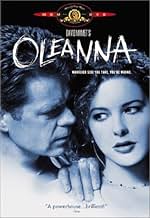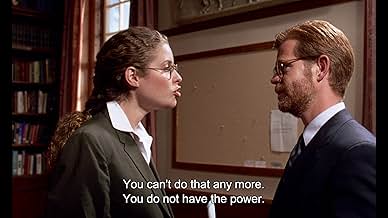IMDb RATING
6.5/10
3.7K
YOUR RATING
When a student visits her professor to discuss how she failed his course, the discussion takes an awkward turn.When a student visits her professor to discuss how she failed his course, the discussion takes an awkward turn.When a student visits her professor to discuss how she failed his course, the discussion takes an awkward turn.
- Awards
- 1 nomination total
Diego Pineda
- Quarterback
- (uncredited)
Scott Zigler
- Clerk in Copy Shop
- (uncredited)
Featured reviews
This film is basically about a student who cannot accept she's failing class and decides to ruin her teacher's life by framing him. Around this basis, a quite witty dialogue is unfolded, which makes the movie intellectually stimulating and powerful. Additionally, it depicts the invalidity of some axioms of both professor and student community and portraits how people manipulate the truth to serve their personal interests. A very strong point is how pompous and cliche arguments about void pseudo-liberties alienate people from truly disastrous and desperate situations. As I see from other reviews, the play was much better, but unfortunately we didn't have the chance to see it here in Greece yet, so my first impression of Mamet's work was from this movie.
David Mamet's "Oleanna" is a harrowing, horrifying, gut-wrenching portrayal of two human beings who have entered into - as John, the professor played by William H. Macy declares - an agreement as to certain forms and institutions - and the institution of grading is, though the catalyst for what follows, the least of concerns here.... "Oleanna" is set squarely in the midst of contemporary academia, but the issues it addresses are more far-reaching than those pertaining solely to classrooms and the offices of intellectuals. That said, many may have difficulty relating to the characters and to the specifics of the situation in which they find themselves - the drama is more often than not a drama of words, ideas - "discourses." But these are, ultimately, only the incidentals - or better, the particular manifestations - of what is at root as "simple" as a basic communication breakdown: "I don't understand" is a phrase uttered countless times by both of the protagonists/antagonists. And ultimately, this is what "Oleanna" is really "about": the difficulty - the impossibility?, as it is suggested - for two people to understand each other on the most fundamental level.... The "plot," such as it is, is rather simple: a private meeting between professor and student yields two wildly divergent ideas of what actually took place, and why. Carol, an intense and troubled young student, is concerned with her apparently miserable grade in a course taught by John, and goes to meet him in his office to discuss it. Initially, the audience's sympathies are squarely with Carol - especially in light of the brusque, brutal, even cruel manner with which John initially dismisses her. But slowly, John softens - he begins to see himself in the young girl, and soon he allows his guard to slip - he "dissolves the boundaries between teacher and student" and undertakes to help Carol as a fellow, sympathetic human being.... The equilibrium - if in fact there ever is any at all - is not, however, to last for long; the encounter results in a savage power-struggle in which each participant fails to connect with the other and, ultimately self-absorbed, fails to understand the other's position and motives. "Oleanna" is really about the consequences, it seems, of abstraction - and Mamet and his actors do a wonderful job of demonstrating the disjunction between the real, human core of individuals and the superficial personae that are variously self-adopted and assigned by the other. There are several moments where entente seems on the very verge of realization, in which "feelings" emerge to bridge the gaps separating the middle-aged, middle-class, white male teacher and the young, lower-class, white female student - but the moments are always interrupted by one or the other of the two participants, through, basically, self-absorbed self-indulgence of immediate concerns - be they material or psychological. And each immediately falls back into the traditional, comfortable role s/he has been playing. This film troubled me a great deal - both at the time I watched it, and later. There are, in fact, no easy answers, and the tagline "whichever side you choose, you're wrong" has come to seem to me much truer than I at first thought. The film really is a Foucault-informed meditation on power and discourse - both consciously exercised and unconsciously-assumed. But ultimately, I think, the film indicates that no solutions can be discovered in the very foundation of the problem - the modern tendency to abstract identity from socio-political and intellectual discourses. John seems much closer to the truth than Carol - but he is no less wrong for it - for he fails to "practice what he preaches," whether or not he knows it. These issues are "universal" in today's post-modern Western world - but perhaps nowhere are they better exemplified, or more serious, than in academia, where words are the foundation of life itself. As a chosen academic myself, and as both student and teacher, I found this film woefully plausible (in many respects - the fact that even a second, let alone a third and fourth meeting ever took place is admittedly rather incredulous) and relevant; quite frankly, it terrified me. I can honestly say - even considering my guilty addiction to cheap horror flicks - that "Oleanna" is the scariest movie I have seen in years....
10oowawa
One writer perceptively suggests that the term "Oleanna" was used to describe swampland being sold as prime real estate.
I think the primary context in which the title "Oleanna" is to be understood appears in a "folk" stanza preceding Mamet's published edition of the play:
"Oh to be in 'Oleanna,'/ That's where I would rather be,/ Than be bound in Norway/ And drag the chains of slavery."
And so, Oleanna is a version of a Utopian promised land, and in the context of the play, the gateway to this better tomorrow is through the halls of Academia. Susan, the victim of her own false expectations of how the university is to transform her existence, repeatedly mentions the struggle she had to endure in order to get into college. For her, academic success is central to her vision of a better life. John, the pedantic professor, also sees Academia as the means to a comfortable, upper middle class existence with his new house, wife, and son. All he needs to do is make tenure, and his future is secured.
However, John presents himself as an academic bad-boy who debunks the very Academia with which he is trying to secure his comfortable future. This ridicule of the academic process strikes at the heart of Carol's dreams of a better future through education. She quite rightly sees that the professor is trying to have it both ways--playing the academic outsider while trying to kiss-up to the tenure committee in order to ensure his cushy new home in the suburbs. When someone's dreams are threatened, they become angry and strike out, however they can.
This is a brilliant movie. Anyone working in a high school or university, and anyone contemplating an academic career, needs to watch it, and allow it to soak deep into the structure of the brain. Perhaps that academic career isn't such a good idea, after all. Maybe that utopian real estate is really swampland. At any rate, one needs to be very, very careful when dealing with students.
I think the primary context in which the title "Oleanna" is to be understood appears in a "folk" stanza preceding Mamet's published edition of the play:
"Oh to be in 'Oleanna,'/ That's where I would rather be,/ Than be bound in Norway/ And drag the chains of slavery."
And so, Oleanna is a version of a Utopian promised land, and in the context of the play, the gateway to this better tomorrow is through the halls of Academia. Susan, the victim of her own false expectations of how the university is to transform her existence, repeatedly mentions the struggle she had to endure in order to get into college. For her, academic success is central to her vision of a better life. John, the pedantic professor, also sees Academia as the means to a comfortable, upper middle class existence with his new house, wife, and son. All he needs to do is make tenure, and his future is secured.
However, John presents himself as an academic bad-boy who debunks the very Academia with which he is trying to secure his comfortable future. This ridicule of the academic process strikes at the heart of Carol's dreams of a better future through education. She quite rightly sees that the professor is trying to have it both ways--playing the academic outsider while trying to kiss-up to the tenure committee in order to ensure his cushy new home in the suburbs. When someone's dreams are threatened, they become angry and strike out, however they can.
This is a brilliant movie. Anyone working in a high school or university, and anyone contemplating an academic career, needs to watch it, and allow it to soak deep into the structure of the brain. Perhaps that academic career isn't such a good idea, after all. Maybe that utopian real estate is really swampland. At any rate, one needs to be very, very careful when dealing with students.
David Mamet can write a play! This one made me writhe with anger at the P.C. crowd in our universities (not that all PC is bad--I am a linguist)who are watering down the national education. What's wrong with saying what you mean? I am a woman and I cannot actually believe that there are two sides on this issue...a pat on the back cannot possibly be seen (alone) as sexual harassment, nor can writing a very bad essay merit an "A" in my idealistic mind. A poor writer is a poor writer, no matter what the background. Many of out best American writers have come from the working class. Should education be modified yet again to accommodate those who do not care to work for their merits? Just a thought. Would love to hear more from others...
William H. Macy plays a professor, and Debra Eisenstadt plays a student who needs an A in the class she is taking from him. They argue as to why she should or shouldn't get an A. In the course of their arguing, the student finds cause to charge the professor, who is up for tenure, with sexual harassment and takes her case to the tenure committee.
The movie runs about an hour and a half. It was slow going, but as I was about to flip away from it (watching it on cable), I checked how long it had to go, and it was about half-way through. I figured, oh well, there's still some Canadian Club I need to get rid of, and tomorrow's a holiday, so I stuck with it. And I'm glad I did.
It is not a good movie, and maybe not even a very good play. Mamet's direction is ultra-stagy, even more declamatory than live theater would normally allow for, let alone a movie. For about an hour and a half, the actors hurl complete sentences and big chunks of paragraphs at one another.
Are Mamet and the actors really that insensitive to the conventions of film? Not likely. I think he chose that artificial manner in order to distance the audience from the characters and bring the ideas to the foreperhaps in the same vein as Bertolt Brecht's notion of "epic theater".
This is not so much a movie or a play as it is a staged philosophical dialogue. It examines the power relationships between man and woman, teacher and student. When the student comes to the professor to reveal the case she has built against him, it shows how words and deeds in one context can be given a whole different thrust and meaning when used to "build a case". Or are they really that different? Perhaps her case focuses and explicates the real underlying relationship of those words and deeds. Those are the kinds of questions Mamet raises, and I think it is a masterful exploration.
But is it a movie? Well, it is certainly dramatic, if stilted, and the dénoument is devastating. It may not be a good movie, but Mamet knew exactly what he was doing, and I'd watch it again.
The movie runs about an hour and a half. It was slow going, but as I was about to flip away from it (watching it on cable), I checked how long it had to go, and it was about half-way through. I figured, oh well, there's still some Canadian Club I need to get rid of, and tomorrow's a holiday, so I stuck with it. And I'm glad I did.
It is not a good movie, and maybe not even a very good play. Mamet's direction is ultra-stagy, even more declamatory than live theater would normally allow for, let alone a movie. For about an hour and a half, the actors hurl complete sentences and big chunks of paragraphs at one another.
Are Mamet and the actors really that insensitive to the conventions of film? Not likely. I think he chose that artificial manner in order to distance the audience from the characters and bring the ideas to the foreperhaps in the same vein as Bertolt Brecht's notion of "epic theater".
This is not so much a movie or a play as it is a staged philosophical dialogue. It examines the power relationships between man and woman, teacher and student. When the student comes to the professor to reveal the case she has built against him, it shows how words and deeds in one context can be given a whole different thrust and meaning when used to "build a case". Or are they really that different? Perhaps her case focuses and explicates the real underlying relationship of those words and deeds. Those are the kinds of questions Mamet raises, and I think it is a masterful exploration.
But is it a movie? Well, it is certainly dramatic, if stilted, and the dénoument is devastating. It may not be a good movie, but Mamet knew exactly what he was doing, and I'd watch it again.
Storyline
Did you know
- TriviaDavid Mamet's script was heavily criticized as sexist. He defended himself against this allegation in (Guardian supplement) (UK) 8 April 2004, pg. 8-9, "'Why can't I show a woman telling lies?'"
- GoofsWhen Carol leaves John's office after their second meeting, shouting "Help!", the shadow of the camera covers the door.
- Alternate versionsThere is a version of the movie circulating in Australia, in a series of videos along with other David Mamet films including "A Life in the Theater". This particular copy of the film is timecoded. In that version, after Carol tells John not to call his wife "baby," (thus sending him into a torrent of rage), and he slaps her arm and grabs her, screaming a sexual expletive and raising a chair above her head, the door to the hallway swings open and a number of people stand in the hallway, observing the fight and thus hopelessly damning John. In the version now appearing on The Sundance Channel (10/05), the expletive is unchanged but he never lifts the chair and the door never opens; aside from a final exterior shot of the school, the film ends with Carol (Eisenstadt) having collapsed on the floor of John's office, and John sitting in his chair, his head buried in his hands.
- SoundtracksLong Ago And Far Away
Words by David Mamet
Music by Rebecca Pidgeon
Soloist: Steve Goldstein (as Steven Goldstein)
© Copyright 1994 Dwight Street Music
- How long is Oleanna?Powered by Alexa
Details
- Release date
- Countries of origin
- Official sites
- Language
- Also known as
- David Mamet's Oleanna
- Filming locations
- Production companies
- See more company credits at IMDbPro
Box office
- Gross US & Canada
- $124,693
- Opening weekend US & Canada
- $25,316
- Nov 6, 1994
- Gross worldwide
- $124,693
Contribute to this page
Suggest an edit or add missing content
























